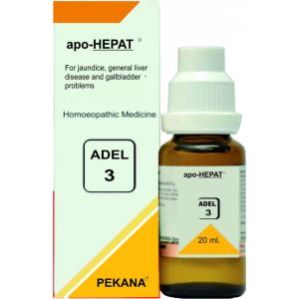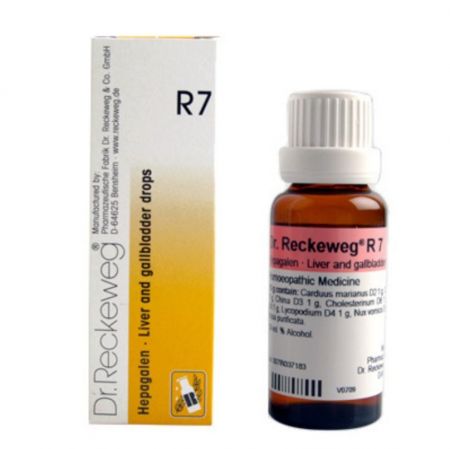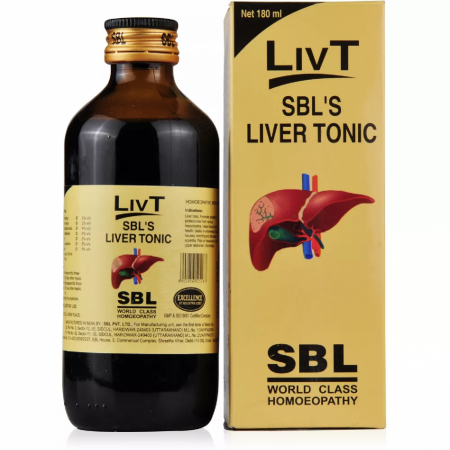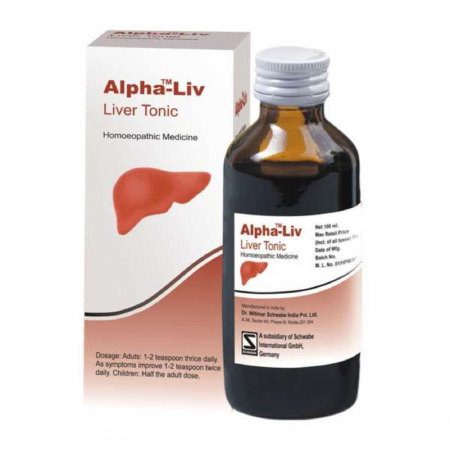ADEL 3 (Apo-Hepat) LIVER DROP
Adel 3 (apo-HEPAT) LIVER DROP is homeopathic medicine to treat symptoms of liver disease and gall bladder diseases through a proprietary blend of several homeopathic herbs (available in drops). It has key Ingredients like chioanthus virginica, cynara scolymus etc that act on general liver diseases, gall bladder problems and jaundice. It is also indicated to detoxify and treat liver, pancreas and gall bladder. It aids in excretion of liver toxins and eliminate liver portal blockages. This medicine increases the secretions of liver and gall bladder, stimulates circulation and improves lymphatic system.
₹280.00
₹295.00
- Product Type :
(Inclusive of all taxes)
-

No Warranty
-
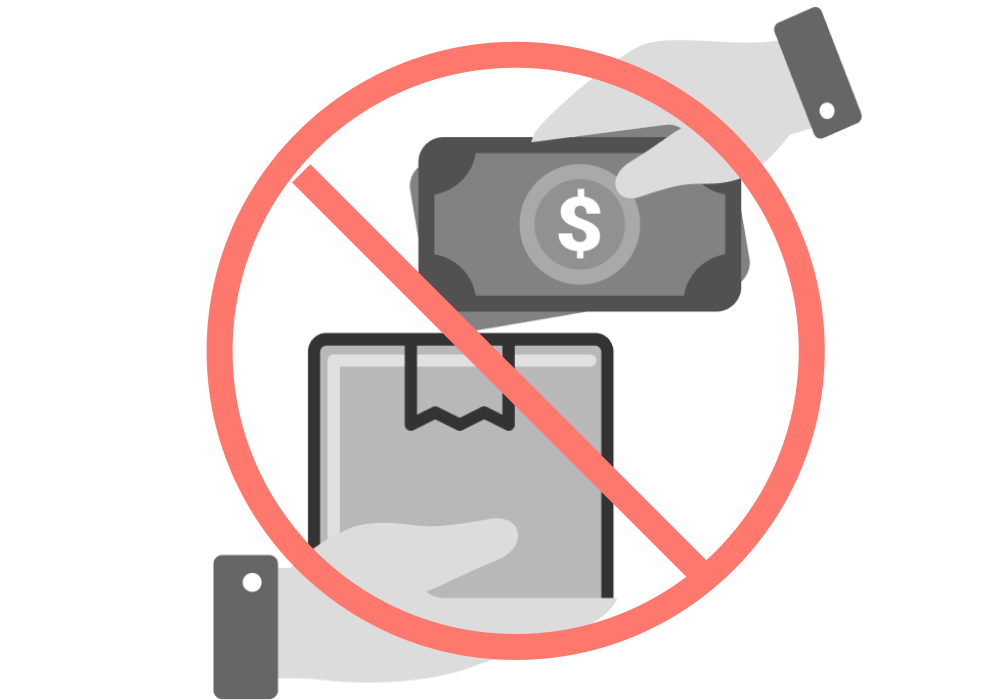
COD Not Avilable
-

Non Returnable
-

Non cancelable
Specifications
| Product Type | PATENT |
About this item
Brand Name: Adel
Description:
ADEL 3 (Apo-Hepat) LIVER DROP
As the largest gland in the body, the liver serves as a processing factory of unmatched importance. It plays a key role in removing toxins and metabolic waste products from the blood ADEL 3 (apo- HEPAT) detoxify the liver, gallbladder and pancreas, which work together to promote good digestion. This remedy provides a vital stimulus that aids in the excretion of liver toxins, thereby enabling the tissues to regenerate and resume normal function
COMPOSITION of ADEL 3 (Apo-Hepat)
Chioanthus virginica 4X, Cynara scolymus 4X, Iberis amara 6X, Lycopodium clavatum 4X, Mandragora e rad sicc 6X, Peumus boldus 4X, Phosphorus 10X, Taraxacum officinale 12X.
Chioanthus virginica resolves upper stomach ailments, vegetative dystonia (autonomic nervous system dysfunction) and dysfermentation of the liver and pancreas. In addition, this herb relieves colic (painful spasms) and has a systemic effect that helps in migraines. It also addresses rheumatic processes and inflammation in the hepatic area.
Cynara scolymus primarily helps in dyspepsia and hepatogenic gastritis. It is also effective for relieving blockage of the portal vein into the liver, and promotes excretion of toxins that accumulate in the organs and connective tissues from endogenous and exogenous sources. In addition, Cynara scolymus can help resolve acute and chronic infections, swelling of the liver, diabetes, hemorrhoids and digestive difficulties.
Iberis amara helps strenghthen the heart muscle and coronary vessels, and improves peripheral circulation. It is helpful in gastro-hepatic disruptions with symptoms that include intestinal pain and cramps.
Lycopodium clavatum helps removing metabolic waste products and stimulates the excretion of excess cholesterol. Without proper excretion of waste products, patients can develop symptoms that include a strong desire to consume excessive amounts of sweets. This craving, often accompanied by mood swings, irritability and depression, points to psychosomatic processes in which the body attempts to compensate by feeding the intestines sugar.
Mandragora e rad sicc addresses digestive upset, disruption of proper stomach and liver function and pancreatic weakness accompanied by strong flatulence (in the case of spastic constipation).
Peumus boldus acts as a powerful stimulant for the gallbladder. This medication promotes stomach secretion and excretion of urea. It also secondarily helps in dyspepsia and hepatogenic gastritis.
Phosphorus helps relieve diseases of the stomach and intestinal tract, ranging from bleeding ulcers (Ulcera ventriculi, Ulcera duodeni) to acute liver dysfunction with accompanying spasms. Depression and other psychosomatic symptoms, as well as painful headaches, are also addressed. In addition, Phosphorus can effectively heal infections found throughout the body, including the eyes, respiratory tract, heart and intestinal tract, as well as helps in degenerative changes in the bone structures.
Taraxacum officinale cleans the liver and renal system. This bitter-tasting plant also addresses afflictions of the gallbladder, and stimulates the gastrointestinal tract, pancreas and liver to overcome impairment caused by illnesses such as rheumatism or arthritis.
RECOMMENDED DOSAGE (Unless Otherwise Prescribed)
Adults - 15-20 drops, Children - 7-10 drops, 3 times a day in 1/4 Cup of water.
Terms and Conditions
Homeopathic products have several uses and should be taken on the basis of symptom similarity. Results may vary depending upon the conditions.
ADEL 3 (Apo-Hepat) LIVER DROP
As the largest gland in the body, the liver serves as a processing factory of unmatched importance. It plays a key role in removing toxins and metabolic waste products from the blood ADEL 3 (apo- HEPAT) detoxify the liver, gallbladder and pancreas, which work together to promote good digestion. This remedy provides a vital stimulus that aids in the excretion of liver toxins, thereby enabling the tissues to regenerate and resume normal function
COMPOSITION of ADEL 3 (Apo-Hepat)
Chioanthus virginica 4X, Cynara scolymus 4X, Iberis amara 6X, Lycopodium clavatum 4X, Mandragora e rad sicc 6X, Peumus boldus 4X, Phosphorus 10X, Taraxacum officinale 12X.
Chioanthus virginica resolves upper stomach ailments, vegetative dystonia (autonomic nervous system dysfunction) and dysfermentation of the liver and pancreas. In addition, this herb relieves colic (painful spasms) and has a systemic effect that helps in migraines. It also addresses rheumatic processes and inflammation in the hepatic area.
Cynara scolymus primarily helps in dyspepsia and hepatogenic gastritis. It is also effective for relieving blockage of the portal vein into the liver, and promotes excretion of toxins that accumulate in the organs and connective tissues from endogenous and exogenous sources. In addition, Cynara scolymus can help resolve acute and chronic infections, swelling of the liver, diabetes, hemorrhoids and digestive difficulties.
Iberis amara helps strenghthen the heart muscle and coronary vessels, and improves peripheral circulation. It is helpful in gastro-hepatic disruptions with symptoms that include intestinal pain and cramps.
Lycopodium clavatum helps removing metabolic waste products and stimulates the excretion of excess cholesterol. Without proper excretion of waste products, patients can develop symptoms that include a strong desire to consume excessive amounts of sweets. This craving, often accompanied by mood swings, irritability and depression, points to psychosomatic processes in which the body attempts to compensate by feeding the intestines sugar.
Mandragora e rad sicc addresses digestive upset, disruption of proper stomach and liver function and pancreatic weakness accompanied by strong flatulence (in the case of spastic constipation).
Peumus boldus acts as a powerful stimulant for the gallbladder. This medication promotes stomach secretion and excretion of urea. It also secondarily helps in dyspepsia and hepatogenic gastritis.
Phosphorus helps relieve diseases of the stomach and intestinal tract, ranging from bleeding ulcers (Ulcera ventriculi, Ulcera duodeni) to acute liver dysfunction with accompanying spasms. Depression and other psychosomatic symptoms, as well as painful headaches, are also addressed. In addition, Phosphorus can effectively heal infections found throughout the body, including the eyes, respiratory tract, heart and intestinal tract, as well as helps in degenerative changes in the bone structures.
Taraxacum officinale cleans the liver and renal system. This bitter-tasting plant also addresses afflictions of the gallbladder, and stimulates the gastrointestinal tract, pancreas and liver to overcome impairment caused by illnesses such as rheumatism or arthritis.
RECOMMENDED DOSAGE (Unless Otherwise Prescribed)
Adults - 15-20 drops, Children - 7-10 drops, 3 times a day in 1/4 Cup of water.
Terms and Conditions
Homeopathic products have several uses and should be taken on the basis of symptom similarity. Results may vary depending upon the conditions.
0 Review Of Product ADEL 3 (Apo-Hepat) LIVER DROP

